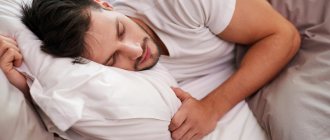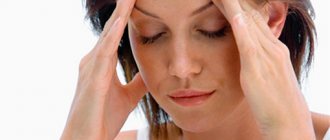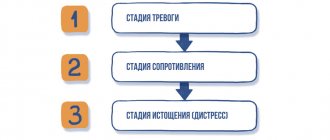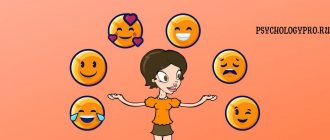Any competent doctor will tell you that you need to control your psycho-emotional state; if you can’t do it yourself, you can even be prescribed medications. Why is this so important? When stressed, the hormone cortisol is released. It affects the functioning of all body systems. Because of this, the functioning of the cardiovascular and nervous systems is disrupted, which can lead to deterioration in well-being, sleep problems, and problems with the gastrointestinal tract.
People who know how to cope with stress and avoid conflict situations tend to lead fulfilling lives. They have enough energy for work, friends and hobbies. Mentally balanced people have happy families, give birth to healthy children and raise them to be just as psychologically balanced.
The impact of stress on human health
Scientists have proven that the body of people who are constantly exposed to stress wears out 40% faster than those of those people who live in peace. Frequent stressful situations cause the following symptoms:
- Redness of the skin, various rashes;
- Feeling tired and exhausted even after a full sleep;
- Loss or gain of body weight;
- Constant feeling of anxiety;
- Tremor (shaking) of the limbs;
- Stool disorder.
If you do nothing, there is a high chance of developing the following pathological processes:
- Panic attacks;
- Depression;
- Heart failure;
- Stomach ulcer;
- Hypertension;
- Anorexia;
- Stress can also cause a decrease in sex drive in both women and men.
Emotional stress and prevention of its consequences
About the article
7026
0
Regular issues of "RMZh" No. 9 dated 05/03/2006 p. 694
Category: General articles
Author: Voznesenskaya T.G.
For quotation:
Voznesenskaya T.G. Emotional stress and prevention of its consequences. RMJ. 2006;9:694.
The term “stress” refers to a human condition that occurs in response to a variety of external and internal strong influences (stressors). The concept of stress is inextricably linked with the name of Hans Selye, who described stress as a nonspecific response of the body to any change that requires restructuring and adaptation. During periods of stress, adaptive changes are observed at the physiological, mental and behavioral levels. In other words, it is possible to define stress as a multicomponent response of the body to any stressful event. It should be immediately emphasized that a stressful event can be not only a negative emotional situation (illness, death, divorce, job loss, failure in an exam, etc.), but also a positive event if it requires adaptation and adaptation to a new, unusual situations. An example of obviously positive stressful events could be: the birth of a child, entering college, obtaining a higher position, buying an apartment, long-awaited marriage, etc. All these events, both negative and positive, are united by one quality - they require a person’s adaptation to new, changed conditions of existence. Consequently, any significant change in usual life can be attributed to a stressful situation. That is why we can state that life without stress is impossible and every person constantly faces stressful situations throughout his life. Stress can be divided into two types – eustress and distress. Eustress – has a positive effect on a person, mobilizes him, improves attention, reactions, and mental activity. Eustress increases the body's adaptive capabilities. Distress is a pathological type of stress syndrome that has a negative effect on the body and mental activity and behavior of a person, up to their complete disorganization. Distress is accompanied by hyperactivation of neurohumoral systems and can become a pathogenic factor leading to damage to almost any organs and systems of the body. Distress can lead to the onset or aggravate the course of neurotic, psychosomatic and organic diseases. What type of stress will arise in a particular person depends on a combination of many factors: physical and mental health, personality characteristics, habitual response to stressors, the system of individual psychological defenses, the presence or absence of social support in a situation of stress. In the psychological literature, the concepts of stress availability and stress resistance are actively discussed, since they largely determine whether a person will experience distress in response to a certain event. Stress resistance is characteristic of physically healthy, emotionally stable individuals with an active life position, low anxiety and adequate self-esteem. Stress tolerance is mainly characteristic of passive, dependent, highly anxious individuals or those prone to depressive and hypochondriacal reactions. Stress tolerance increases with lack of sleep, physical or mental exhaustion, after an illness, etc. Undoubtedly, the strength and duration of the stressor itself plays a role. There is a test to measure the amount of daily stress experienced by a person, which was proposed by researchers Holmes and Ray. This test contains more than 40 possible life stressors, each of which has a different score depending on the amount of effort a person needs to overcome a particular life situation. The test contains both negative and positive life situations that require adaptation (for example, the death of a loved one, moving to a higher position, etc.). The test allows you to assess the strength of stress on a person, which is reflected in the sum of the points of those events that happened to the test subject over the past six months. Research has shown that there is a direct correlation between the severity of stress and the likelihood of loss of physical or mental health.
Distress manifests itself differently in different people, but there are universal characteristics of distress. One of the obligate signs of distress is anxiety. Each individual has a certain level of anxiety, and everyone has their own optimal level of anxiety that allows a person to function at their best. However, along with the productive anxiety that accompanies eustress, there is unproductive anxiety that is characteristic of distress. Unproductive anxiety disrupts cognitive and autonomic processes. It impairs attention and memory, reduces performance, increases irritability, causes excessive muscle tension, reduces appetite, and disrupts sleep. The role of distress in the formation of psycho-vegetative disorders is enormous. Autonomic changes following distress are very diverse and can manifest themselves in almost all organs and systems of the body. Symptoms from the cardiovascular system are often manifested by an increase in heart rate, a feeling of pulsation, an increase or fluctuation in blood pressure, and a tendency to lipotimic states. From the respiratory system, there may be a feeling of lack of air with the formation of hyperventilation syndrome. From the gastrointestinal tract, nausea, retching, vomiting, loss of appetite, dyspeptic symptoms or constipation, and abdominal cramps are common. Distress is also characterized by other vegetative manifestations: increased sweating, chills, feeling hot or cold, feeling dizzy, and frequent urination. The important role of stress in the occurrence of panic attacks or autonomic crises is discussed. A panic attack should be considered one of the most striking manifestations of a psychovegetative syndrome, in which a polysystemic pattern of autonomic disorders and a strong emotional accompaniment in the form of panic are observed. Among the situations that can lead to the debut of panic attacks, the following stress-related events are distinguished: “significant changes in life” - a long-term illness or death of a loved one, divorce, separation from loved ones, etc.; events associated with changes in one’s own health - physical overload, prolonged fasting, pregnancy, abortion, childbirth, surgical interventions, somatic illness and, finally, exacerbations of conflict situations provoked by stress. After stress, various pain syndromes very often debut or worsen: tension headaches, frequency and severity of migraine attacks, myofascial pain syndromes. In these cases, muscle tension that accompanies distress and anxiety is of paramount importance. Muscle tension is an obligatory sign of stress and anxiety. Quite often during a stressful situation, this is manifested by a feeling of tension in the muscles of the neck and jaws, clenched teeth, tightly clenched fingers and toes, tension in the muscles of the forehead, a frowning face, sudden jerky movements, motor hyperactivity, and excessive blinking. Stress also disrupts motivational processes: appetite changes and libido decreases. Changes in appetite due to stress can be just the opposite. 70% of the population experiences a decrease in appetite. If this reaction is severe, it may be accompanied by nausea, vomiting, aversion to food, or temporary inability to eat. In 30% of the population, the opposite hyperphagic reaction to stress is observed with increased cravings mainly for easily digestible, high-carbohydrate foods. In accordance with one or another reaction, body weight also changes. During periods of severe stress, a person may lose several kilograms or, on the contrary, gain weight. Stress can not only reduce libido, but also disrupt the menstrual cycle in women, lead to premature birth, and reduce or completely block lactation after childbirth. During distress, the activity of the hypothalamic-pituitary-adrenal axis increases excessively and cortisol hyperactivity is observed. A number of possible pathological reactions are associated with this: sympatho-adrenal activation with a tendency to vasoconstriction, decreased heart rate variability, hyperactivation and hyperaggregation of platelets, increased heart rate, arterial hypertension, increased C-reactive protein and pro-inflammatory cytokines - interleukin 1 and interleukin 6 Elevated cortisol levels also contribute to the development of atherosclerotic processes. Through these mechanisms, stress can provoke the occurrence of cardiovascular diseases. The literature describes a reliable number of facts of a significant increase in cardiovascular mortality after people experience extreme stress (natural disasters, man-made disasters). For example, in the controlled ONSET study, which involved 1623 patients with non-fatal myocardial infarction, it was found that within two hours after experiencing intense anger, the cause of which was most often a family quarrel (25% of cases) or a conflict at work (22% of cases) ), the relative risk of developing myocardial infarction significantly increases by 2.3 times. Another five-year prospective study (95,647 people) found that the risk of coronary death after the death of a loved one increased by 2 times in men and 3 times in women. Overactivity of the hypothalamic-pituitary-adrenal axis can lead to hyperglycemia and insulin resistance, contributing to the development of diabetes mellitus. Recently, stress-induced impairment of neuroplasticity has been considered in the pathogenesis of depression. Disturbances in neuronal plasticity in depression are associated with stress-induced hyperreactivity of the hypothalamic-pituitary-adrenal axis and, accordingly, hyperactivity of corticotropin-releasing factor, adrenocorticotropic hormone and cortisol, which leads to a decrease in the activity of brain-derived neurotrophic factor (BDNF), impaired metabolism of phospholipid P-substance and neurokinins , disruption of the activity of NMDA receptors with increased toxic effects of glutamate on neurons and disruption of the interaction of glutamatergic and monoaminergic pathways. Thus, the prevention of stress and its consequences is an extremely urgent task. Reducing the manifestations of multisystem stress reactions should be carried out at the earliest stages before the development of certain pathological conditions. Excessive anxiety, as the first and obligate sign of any distress, plays a decisive role in the formation of the initial manifestations of psychovegetative syndrome. Psychotherapy, autogenic training, physical therapy, physiotherapy, and herbal medicine play a significant role in the treatment of stress-induced anxiety reactions and psychovegetative manifestations. In advanced clinical conditions, treatment with psychotropic drugs, mainly tranquilizers and antidepressants, is used. However, in clinical practice, even with subsyndromal psychovegetative stress-induced disorders, tranquilizers – benzodiazepine derivatives – are unjustifiably widely used. However, in these cases, their use is unjustified due to a number of side effects, the possible development of drug dependence and subsequent withdrawal syndrome. One of the most commonly reported side effects of benzodiazepine derivatives is “behavioral toxicity.” This term combines a number of adverse side effects that impede the patient’s daily activities. These primarily include daytime sleepiness, lethargy, excessive muscle relaxation, decreased concentration and performance, and impaired coordination. In addition, benzodiazepine anxiolytics can have a depressant effect on the respiratory center and reduce myocardial contractility, which complicates their use in somatic patients with corresponding pathology. Due to the high risk of side effects and drug dependence, WHO experts recommend considering “alternative” therapy before prescribing drugs of this series. This is especially true for adaptation disorders, which manifest themselves, in particular, in psychovegetative syndromes associated with emotional stress. In addition, it is not recommended to prescribe benzodiazepine tranquilizers for a period of more than one month (it is advisable to reduce it to two weeks). However, despite WHO recommendations, as well as the rules for prescribing benzodiazepine drugs, which are reflected in both domestic and foreign guidelines, the excessively widespread use of benzodiazepine drugs continues. Moreover, the courses of treatment prescribed by both neurologists and therapists significantly exceed the recommended ones and last from 2 months to six months. Benzodiazepine drugs are also widely used as self-medication when even individual symptoms appear, most often such as mood lability, tearfulness, irritability, a feeling of internal tension, difficulty falling asleep or restless sleep, loss of appetite, lethargy, and general weakness. Such unjustified excessive use of psychotropic drugs produces only negative results. The use of herbal remedies that do not have the complications inherent in benzodiazepines and at the same time have the ability to stop anxiety reactions and reduce the manifestations of psychovegetative syndrome is a good “alternative” to unjustified therapy with benzodiazepine drugs. Herbal preparations that have sedative properties and can be used to treat and prevent the effects of stress include valerian, motherwort, hawthorn, hops, peony, passionflower, lemon balm, heather, and oregano. These herbal remedies are effective for sleep disorders, increased irritability and anxiety. Herbal medicine is an excellent complement to psychotherapeutic treatment. It is important that high compliance was noted among patients who were prescribed phytotherapeutic drugs. According to WHO, up to 80% of the world's population prefer to be treated with medicines of natural plant origin. The class of anti-stress herbal remedies includes the new combined herbal preparation Persen-Forte. The pharmacologically active components of the drug are a dry extract from medicinal plants with anxiolytic activity (valerian, peppermint, lemon balm). Together with Fokina N.M. and Fedotova A.V. We conducted a double-blind, randomized, placebo-controlled study of the clinical effectiveness of Persen-Forte in 93 patients aged 16 to 62 years with psychovegetative syndrome in the structure of neurotic reactions of the anxiety series. Persen-Forte (125 mg) 1 capsule twice a day or placebo were used. The treatment lasted 28 days. The patients' condition was assessed before treatment, on the 7th day of therapy and at the end of the course of treatment. In addition to the clinical impression, the following were assessed using questionnaires: the state of the autonomic nervous system, quality of sleep, quality of life, reactive and personal anxiety, depression. The level of attention was assessed using Bourdon's proof test and using black and white Schulte tables. It is significant that the work used the “Life Events Rating Scale” by Holmes and Rey, which made it possible to assess the degree of exposure of patients to stress six months before the start of the study. The level of stress on the life events scale in patients averaged 165 points. It is believed that if a patient scores more than 150 on this scale, the level of stress he experiences is clearly having a negative impact on his health. The study showed the high clinical effectiveness of Persen-Forte in patients with psychovegetative syndrome that developed against the background of anxiety-neurotic disorders. The results of the study led to the conclusion that the clinical effectiveness of the drug Persen significantly exceeds the effect of placebo. Moreover, after 28 days of treatment with the drug, positive dynamics were noted not only in the subjective well-being of patients, but also a significant improvement according to questionnaire data. Thus, there was a decrease in the levels of both reactive and personal anxiety according to the Spielberger test, a decrease in vegetative manifestations, normalization of sleep, a decrease in the manifestations of subdepression according to the Beck scale, and an increase in the quality of life. The study showed that Persen-Forte has a proven anxiolytic effect, which develops quite quickly by the 7th day of taking the drug and increases during therapy. It is also significant that the parameters of not only reactive, but also personal anxiety improve and the quality of life of patients improves, which can serve as a preliminary prognostic sign of the persistence of the achieved effect. In addition to the anxiolytic effect, Persen-Forte has a distinct vegetotropic effect, reducing the intensity of vegetative manifestations, and also helps to normalize sleep. Of no small importance is the fact that we obtained that the drug does not affect concentration and does not reduce performance, which allows it to be used in outpatient practice in patients who continue active professional activities. The absence of “behavioral toxicity” makes it possible to prescribe Persen-Forte to elderly people. The study allows us to classify the drug Persen-Forte as an effective means of “alternative” therapy with benzodiazepine tranquilizers and recommend it for the treatment of patients with stress-induced anxiety and psychovegetative syndromes. The main advantage of using Persen-Forte is its excellent tolerability, absence of side effects and clinically proven effectiveness. Considering the very high susceptibility to stressors in the modern world, this drug can also be prescribed to healthy people as a prophylactic anti-stress agent, which will prevent the development of the adverse effects of stress on health. Literature 1. Autonomic disorders. – under. Ed. Veina A.M. M.-MIA 1998. 749 p. 2. Vein A.M., Dyukova G.M., Vorobyova O.V., Danilov A.B. Panic attacksInstitute of Medical Marketing 1997.303 p. 3. Voznesenskaya T.G., Fedotova A.V., Fokina N.M. Therapy of anxiety disorders with Persen-Forte in patients with psychovegetative syndrome - J. Treatment of nervous diseases. 4. Drobizhev M.Yu., Iznak A.F. Neuronal plasticity is a new target in the treatment of depression. M. October 2003. 24 p. 5. Mosolov S.N. Clinical use of modern antidepressants MIA, S–P, 1995.565 p. 6. Smulevich A.B., Syrkin A.L. Psychocardiology. MIA M. 2005,776 p. 7. Travell J.G., Simons D.G. – Myofascial pain syndrome. – T.1,2. – M. – Medicine 1989. 8. Bondy B. Pathophysiology of depression. in Dialogues in clinical neuroscience.– 2002 vol.4, No. 1, p.7–20 9. Farnworth NB et all Treatment with Herbal Medicines.– WHO Bull.1985. Vol.63.–p1–16. 10. Kanner AM Depression in Neurological Disorders/– The Lundbeck Institute 2005.–160 p. 11. Dialogues in clinical neuroscience. Neuroplasticity Ed. J–P Macher, M–A Crocq.–2004, Vol. 6, No. 2,250 p. 12. Fuller RW Serotonin uptake inhibitor...Progress in Drug Research 1995.–N– 45 p167–204. 13. Schwarz MJ, M.Ackenheil The role of substance P in depression. in Dialogues in clinical neuroscience.– 2002 vol.4, No. 1, p.21–29 14. Vascular Disease and Affective Disorders Ed. By Ed. Chiu, D. Ames, C. Katona MDLtd 2002, 276 p.
Content is licensed under a Creative Commons Attribution 4.0 International License.
Share the article on social networks
Recommend the article to your colleagues
Sleep as the basis for well-being
Adequate rest and healthy sleep are the first rules of a stable psyche. A well-rested person is more resistant to stress. The norm is considered to be 7-8 hours of sleep (and at least 9 hours if a person trains hard or works on his feet).
If there is not enough sleep, the stability of the nervous system decreases. You've probably observed how small children become capricious when they are tired and want to sleep. A similar condition is observed in adults who regularly do not get enough sleep - it becomes difficult for them to control their emotions, they feel irritation and aggression.
To improve the quality of your sleep, be sure to create a comfortable sleeping environment in your bedroom - darken the room, ventilate it before bed, and try to make the room quiet. Maintain a sleep schedule - try to go to bed and wake up at approximately the same time every day and not deviate too much from this schedule, even on weekends. If these measures do not help, contact a neurologist or somnologist. Your doctor will help you improve your sleep and quality of night's rest.
Causes of stress
Stress can be caused by two main factors - external or internal.
External reasons
External causes include situations that a person cannot control. These could be natural disasters, catastrophes, political actions, environmental conditions, meteorological conditions, actions of other people, the general atmosphere in the society where the individual lives, and the like.
Internal reasons
Internal factors are determined by character traits, personality traits, beliefs and stable forms of response to external circumstances.
For example, if a person with high self-esteem, self-confidence and a strong psyche is abandoned by a partner, he will quickly get over the trouble and will soon be ready for new acquaintances. A person with low self-esteem, anxious and suspicious traits and an unstable psyche is capable of suffering for a long time and painfully, falling into real depression or even lowering his self-esteem.
Stress is caused by conflicts of internal attitudes, beliefs, cognitive dissonance, and a discrepancy between expectations and reality.
Stress can be caused by physical and mental fatigue, but it also stems from psychological factors. If a person tears himself up, it means he is ignoring the needs of his body and treating himself worse than he should.
Meditation and psychotherapy, their impact on health
Meditation is a great way to cope with depression and stress without medication.
The effect of meditation on the body is:
- Improving brain function. It has been scientifically proven that a course of meditation helps restore brain cells;
- Reducing the risk of developing heart disease;
- Eliminate feelings of anxiety;
- Developing mental resistance to stress;
- Increasing immunity and strengthening the body's defenses.
Scientists from Washington conducted an interesting study. 15 colleagues from one enterprise voluntarily took part in it. Before the rehabilitation course, each of the volunteers underwent a stress resistance test. It turned out that 14 out of 15 workers live in constant stress and cannot effectively cope with nerve-wracking situations.
The workers completed an eight-week meditation course under the supervision of a specialist - and a repeat test showed that the workers became much calmer and learned to control their emotions. Psychotherapy also shows good results - it helps solve problems and combat anxiety.
Psychotherapy for the treatment of stress
The most effective method of relieving stress is psychotherapy. A specialist helps you better understand yourself, your true needs and desires. Under his guidance, it will be easier for the patient to discover the cause of stress and get rid of it.
Psychotherapy cannot protect people from stress; it is an integral part of our lives. But effective techniques allow you to destroy destructive beliefs, learn to react differently to difficult situations, thereby reducing the load on your psyche.
To treat stress in psychotherapy, the following methods are used:
- Gestalt therapy. Building a more holistic view of traumatic events. Finding and applying methods from completion.
- Cognitive behavioral therapy.
- Destruction of negative beliefs, forms of response and behavior and the formation of alternative forms of response that are favorable to the individual.
- Hypnotherapy. Detection and elimination of causes that the patient cannot understand independently in the normal state.
There are other methods of psychotherapy. They are selected individually, depending on the patient’s problem.
For physiological symptoms (psychosomatics) that interfere with the quality of life, the psychotherapist can prescribe medications to the patient to relieve unpleasant symptoms.
How to learn to control your psycho-emotional state?
How to maintain health and increase stress resistance?
- Don't take on several things at once. Complete every task you start without being distracted by extraneous factors. If your job does not allow you to do only one thing, make a schedule for the priority of tasks and, in the time allocated for a task, do only it.
- If you are nervous about a situation, ask yourself if there is something you can do. If not, then you need to come to terms with the fact that this situation and its result are beyond your control and try to distract yourself with something else. If you can, no need to worry, just do it.
- Try to develop independent self-esteem. Of course, listening to a negative assessment and scolding is unpleasant - but, if you think about it, this assessment has nothing to do with you. This is just the opinion of another person, which can be taken into account if the person is important to you, but should not be taken as an objective reality. Evaluate yourself.
- Set realistic goals for yourself. Not the easiest, but achievable. When determining the deadline for completing a task, reserve 15-20% of the time for force majeure situations and the human factor, then delays will not unsettle you.
- Light physical activity helps stabilize the psycho-emotional state - nothing calms you down like a light jog or swimming.
- Go to bed no later than 11 pm, try to sleep at least 8 hours.
- Organize your workplace in such a way that it is pleasant to be there and easy to find everything you need.
- Eat the right foods. For the stability of your psycho-emotional state, it is very important to eat a balanced diet. B vitamins are especially important.
- At least once a week, do something that makes you happy. Meet with friends, dance, eat delicious food, play computer or board games.
If nothing helps, and you feel that it is difficult for you to cope with stress on your own, contact a specialist; you may have depression. In this case, you need qualified treatment.
Signs of emotional stress
The concept of emotional stress was first introduced by the physiologist Hans Selye in 1936. By this, he meant a reaction unusual for the body in response to any adverse impact as a way of adapting to changed conditions. Due to the influence of stimuli (stressors), the body's adaptation mechanisms are in tension. The adaptation process itself has three main stages of development - anxiety, resistance and exhaustion.
Signs of emotional stress will appear in different people to varying degrees of severity.
- Increased irritability
- Tearfulness
- Increased heart rate
- Change in breathing rate
- Loss of control over your reactions and behavior
- Anxiety
- Memory and concentration problems
- Sudden jumps in blood pressure
- Feeling of fear, feeling of despair
- Weakness
- Excessive sweating
- Muscle tension (clamps)
- Feeling short of air
- Constantly feeling tired
- Headache and muscle pain
- Increase or, conversely, decrease in body temperature
- Changes in sleep patterns—drowsiness or insomnia
- Changes in appetite
- Depersonalization - the feeling of being outside the body










